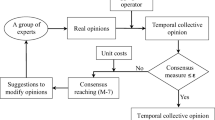Abstract
Nowadays, important decisions that have a significant impact either in societies or in organizations are commonly made by a group rather than a single decision maker, which might require more than a majority rule to obtain a real acceptance. Consensus-reaching processes provide a way to drive group decisions which are more accepted and appreciated by people affected by such a decision. These processes care about different consensus measures to determine the agreement in the group. The correct choice of a consensus measure that reflects the attitude of decision makers is a key issue for improving and optimizing consensus-reaching processes, which still requires further research. This paper studies the concept of group’s attitude towards consensus, and presents a consensus model that integrates it in the measurement of consensus, through an extension of OWA aggregation operators, the so-called Attitude-OWA. The approach is applied to the solution of a real-like group decision making problem with the definition of different attitudes, and the results are analysed.







Similar content being viewed by others
Explore related subjects
Discover the latest articles, news and stories from top researchers in related subjects.References
Beliakov G, Pradera A, Calvo T (2007) Aggregation functions: a guide for practitioners. Springer, Heidelberg
Bryson N (1996) Group decision-making and the analytic hierarchy process. Exploring the consensus-relevant information content. Comput Oper Res 23(1):27–35
Butler C, Rothstein A (2006) On conflict and consensus: a handbook on formal consensus decision making. Food Not Bombs Publishing, Takoma Park
Elzinga C, Wang H, Lin Z, Kumar Y (2011) Concordance and consensus. Inf Sci 181(12):2529–2549
Fedrizzi M, Fedrizzi M, Marques R (1999) Soft consensus and network dynamics in group decision making. Int J Intell Syst 14(1):63–77
Grabisch M, Orlovski S, Yager R (1998) Fuzzy Aggregation of numerical preferences. In: Fuzzy sets in decision analysis: operations, research and statistics. Kluwer, Boston, pp 31–68
Herrera F, Herrera-Viedma E, Verdegay J (1995) A sequential selection process in group decision making with linguistic assessments. Inf Sci 85(1995):223–239
Herrera F, Herrera-Viedma E, Verdegay J (1996) A model of consensus in group decision making under linguistic assessments. Fuzzy Sets Syst 78(1):73–87
Herrera-Viedma E, Herrera F, Chiclana F (2002) A consensus model for multiperson decision making with different preference structures. IEEE Trans Syst Man Cybern A Syst Hum 32(3):394–402
Herrera-Viedma E, Martínez L, Mata F, Chiclana F (2005) A consensus support system model for group decision making problems with multigranular linguistic preference relations. IEEE Trans Fuzzy Syst 13(5):644–658
Herrera-Viedma E, Alonso S, Chiclana F, Herrera F (2007a) A consensus model for group decision making with incomplete fuzzy preference relations. IEEE Trans Fuzzy Syst 15(5):863–877
Herrera-Viedma E, Chiclana F, Herrera F, Alonso S (2007b) Group decision-making model with incomplete fuzzy preference relations based on additive consistency. IEEE Trans Syst Man Cybern B Cybern 37(1):176–189
Herrera-Viedma E, García-Lapresta J, Kacprzyk J, Fedrizzi M, Nurmi H, Zadrozny S (eds) (2011) Consensual processes. Studies in fuzziness and soft computing, vol 267. Springer, Berlin
Kacprzyk J (1986) Group decision making with a fuzzy linguistic majority. Fuzzy Sets Syst 18(2):105–118
Kacprzyk J, Fedrizzi M (1988) A “soft” measure of consensus in the setting of partial (fuzzy) preferences. Eur J Oper Res 34(1):316–325
Kacprzyk J, Fedrizzi M (1989) A ’human-consistent’ degree of consensus based on fuzzy logic with linguistic quantifiers. Math Soc Sci 18 (3):275–290
Kacprzyk J, Zadrozny S (2010) Soft computing and web intelligence for supporting consensus reaching. Soft Comput 14(8):833–846
Klir G, Yuan B (1995) Fuzzy sets and fuzzy logic: theory and applications. Prentice Hall, Upper Saddle River
Kuncheva L, Krishnapuram R (1995) A fuzzy consensus aggregation operator. Fuzzy Sets Syst 79 (3)(3):347–356
Liu X, Han S (2008) Orness and parameterized RIM quantifier aggregation with OWA operators: a summary. Int J Approx Reason 48:77–97
Martínez L, Montero J (2007) Challenges for improving consensus reaching process in collective decisions. New Math Nat Comput 3(2):203–217
Mata F, Martínez L, Herrera-Viedma E (2009) An adaptive consensus support model for group decision-making problems in a multigranular fuzzy linguistic context. IEEE Trans Fuzzy Syst 17(2):279–290
Parreiras R, Ekel P, Martini J, Palhares R (2010) A flexible consensus scheme for multicriteria group decision making under linguistic assessments. Inf Sci 180(7):1075–1089
Pedrycz W, Ekel P, Parreiras R (2011) Fuzzy multicriteria decision-making: models, methods and applications. Wiley, New York
Reformat M, Yager R, Li Z, Alajlan N (2011) Human-inspired identification of high-level concepts using OWA and linguistic quantifiers. Int J Comput Commun Control 6(3):473–502
Roubens M (1997) Fuzzy sets and decision analysis. Fuzzy Sets Syst 90(2):199–206
Saint S, Lawson JR (1994) Rules for reaching consensus. A modern approach to decision making. Jossey-Bass, San Francisco
Shannon C, Weaver W (1949) The mathematical theory of communication. University of Illinois Press, Urbana
Tocqueville A (1840) Democracy in America, 2nd edn. Saunders and Otleym, London
Xu J, Wu Z (2011) A discrete consensus support model for multiple attribute group decision making. Knowl Based Syst 24(8):1196–1202
Yager R (1988) On orderer weighted averaging aggregation operators in multi-criteria decision making. IEEE Trans Syst Man Cybern 18(1):183–190
Yager R (1993) Families of OWA operators. Fuzzy Sets Syst 59:125–148
Yager R (1996) Quantifier guided aggregation using OWA operators. Int J Intell Syst 11:49–73
Yager R (2001) Penalizing strategic preference manipulation in multi-agent decision making. IEEE Trans Fuzzy Syst 9(3):393–403
Yager R, Filev D (1994) Essentials of fuzzy modeling and control. Wiley, New York
Zadeh L (1983) A computational approach to fuzzy quantifiers in natural languages. Comput Math Appl 9:149–184
Zadrozny S, Kacprzyk J (2003) An Internet-based group decision and consensus reaching support system. In: Applied decision support with soft computing (studies in fuzziness and soft computing), vol 124. Springer, Berlin, pp 263–275
Acknowledgments
This work is partially supported by the Research Project TIN-2009-08286, P08-TIC-3548 and FEDER funds.
Author information
Authors and Affiliations
Corresponding author
Rights and permissions
About this article
Cite this article
Palomares, I., Liu, J., Xu, Y. et al. Modelling experts’ attitudes in group decision making. Soft Comput 16, 1755–1766 (2012). https://doi.org/10.1007/s00500-012-0859-8
Published:
Issue Date:
DOI: https://doi.org/10.1007/s00500-012-0859-8




